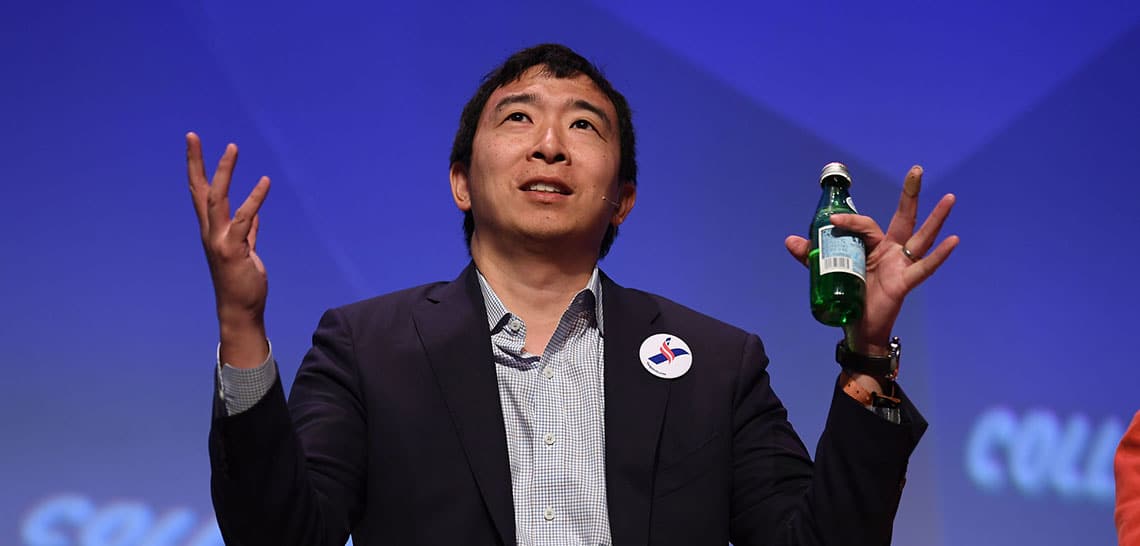
(Source: https://www.flickr.com/photos/collisionconf/27964740018)
On the 14th of November, democratic presidential candidate Andrew Yang, posted his future plans for the regulation of crypto markets. Yang’s avant-garde approach to technology and automation has been lauded by many within the tech-community. However, for the Satoshi Nakamotos of this world, news of regulation coupled with Yang’s signature policy, universal basic income (UBI), has stirred suspicion amongst crypto hard-liners. Thus, the question begs, is tech-enthusiast Andrew Yang the crypto industry’s main man?
Last Thursday, Andrew Yang shared his vision of the regulation required for technology companies on his presidential campaign’s website titled “Regulating Technology Firms in The 21st Century”. In his post, Yang pointed out that “Cryptocurrencies are seeing levels of fraud…”, as a result of lackluster regulation. Such apprehension is genuine as countless Ponzi schemes, such as the OneCoin scam in 2016, have hampered the perceived legitimacy of the crypto-industry. By foregoing the development of a regulatory framework for cryptos, Yang warned that “Other countries […] are leading in this new marketplace” and that it was imperative for the U.S. to “catch up”. This concern comes just weeks after Chinese President Xi Jinping called for greater development in crypto and blockchain technology, with Chinese authorities heeding this call by publishing a new cryptography law.
However, for the libertarian vein that pulsates through much of the crypto-universe, the notion of government regulation within the industry reeks of despotism. For many crypto- hard-liners, Yang is simply an addition to a roster of left-leaning politicians aiming to take control of a new marketplace via state-backed intervention. Yang, in particular, has drawn criticism due to his hall-mark policy proposal of UBI, where he promises to provide $1000 per month to every U.S. citizen over the age of 18. UBI coupled with his recent statements made on his blog calling for the need to “create one national framework [for cryptos]”, have made him suspect.
On the 16th of November, two days after his tech-regulation blog post, Yang received criticism for a Tweet stating “ I’m literally trying to give everybody money”, in relation to UBI. Blockstream CSO Samson Mow, asked Yang, in relation to UBI, “Please be specific that you’re giving away fiat, not money”, referring to the fact that Yang is prepared to hand out state-run money as opposed to non-state-run money. Furthermore, Travis Kling, Ikigai’s chief investment officer, joined in by telling Yang that “Bitcoin is a non-sovereign […] digital store of money […] an insurance policy against monetary and fiscal irresponsibility from central banks and governments globally.” Lastly, Erik Voorhees founder of ShapeShift and a crypto pioneer wrote that Yang’s UBI scheme is “greater than the entire US government budget […]”, in relation to Yang’s blog that claims “Some states have onerous regulations in the space, such as New York’s Bitlicense.” The irony of Voorhees’s comments is that his company ShapeShift disbanded delivering services in New York in protest to regulations imposed on cryptos by Bitliscense.
Regardless of such comments, it is inevitable that the crypto industry will be subject to some form of regulation, that is certain. The question is, how flexible can regulation be in order to protect investors and markets while allowing for such technology to flourish? Yang’s proposals would aim to help facilitate the transparency required between the crypto-industry and the populous, perhaps leading to the wide-spread use of digital assets. Furthermore, Yang is one of the only democratic candidates open and willing to engage in the blockchain and crypto debate, a necessity if any serious discourse over cryptos is set to be had. As an outsider to Washington and having garnered support from people and groups such as Elon Musk, Wired Magazine and cryptocurrency DigiByte, Andrew Yang has very much taken the presidential race by storm in a manner befitting Satoshi Nakomoto. Avant-garde and a tech-enthusiast, there is no doubt that Andrew Yang can become the crypto industries main man.

